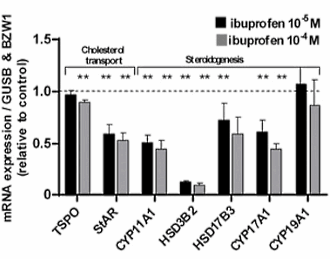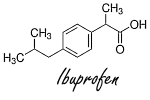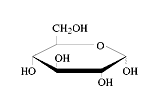|
Ibuprofen induces hypogonadism
There are quite a few athletes who take painkillers like ibuprofen just before a training or competition. By suppressing the pain of exertion, old injuries or overworked joints painkillers allow them to perform better - in the short term. In the longer term these athletes may, according to Danish research recently published in PNAS, lower their testosterone levels.
Study
Danish endocrinologists, affiliated with the University of Copenhagen, divided 31 healthy men aged 18-35 into t2 groups. One group took 2 times a dose of 600 milligrams of ibuprofen every day for 6 weeks. That is the maximum dose according to the pharmaceutical industry. The other group took a placebo.
Results
After two weeks' administration of ibuprofen, the concentration of LH - the hormone that lets the body produce more testosterone - increased significantly in the blood of the men, and after 6 weeks that effect had become even greater. However, the concentration of testosterone did not increase.


As men age, their testes may get more and more trouble maintaining the testosterone level. That's why the LH level in the blood rises. In the first stages of this hormonal aging process, because of the increased LH level, the release of testosterone remains constant. Endocrinologists then speak of 'compensatory hypogonadism'.
At a later stage, however, the testes become insensitive to LH and reduce their release of testosterone. The testosterone level drops. Endocrinologists then speak of 'overt hypogonadism'.
It seems that long-term use of a high dose of ibuprofen imitates and perhaps even accelerates this endocrinological aging process.
When the researchers experimented with pieces of human testes in test tubes, they saw that the production of testosterone was reduced by ibuprofen. This effect became stronger as the concentration of ibuprofen was higher, and as the exposure lasted longer.


Ibuprofen reduced the effect of literally all enzymes involved in the production of testosterone from cholesterol in the testes.
Conclusion
"In the clinical setting, compromised Leydig cell function resulting in increased insensitivity to LH is defined as compensated hypogonadism, an entity associated with all-cause mortality", the reserachers wrote. [J Clin Endocrinol Metab. 2015 Dec;100(12):4472-80.] "Therefore, investigating ibuprofen-induced compensatory hypogonadism is crucial, as this clinical state is generally associated with smoking and aging."
"Further characterizations of the state of compensated hypogonadism induced by ibuprofen, which was already established after 14 d of ibuprofen administration, are therefore important in determining the potential effects on healthy young men."
"Several reports have stressed the high level of long-term analgesic use among both amateur and professional athletes; ibuprofen has been favored in this use and abuse. Of note, an inverse relationship was recently reported between endurance exercise training and male sexual libido, but the possibility that medication uptake might interfere in this observation could not be totally excluded." [Med Sci Sports Exerc. 2017 Jul;49(7):1383-8.]
"Moreover, ibuprofen appears to be the preferred pharmaceutical analgesic for longterm chronic pain and arthritis."
"Therefore it is also of concern that men with compensated hypogonadism may eventually progress to overt primary hypogonadism, which is characterized by low circulating testosterone and prevalent symptoms including reduced libido, reduced muscle mass and strength, and depressed mood and fatigue."
Source:
Proc Natl Acad Sci U S A. 2018 Jan 8. pii: 201715035. doi: 10.1073/pnas.1715035115. [Epub ahead of print].
More:
The testosterone effect of ibuprofen 20.04.2012
Ibuprofen helps immune cells build up muscle tissue 09.08.2010
Ibuprofen and acetaminophen are anabolic for seventy year olds 24.08.2008
Archives:
Boosting Testosterone
Pain Killers
|








